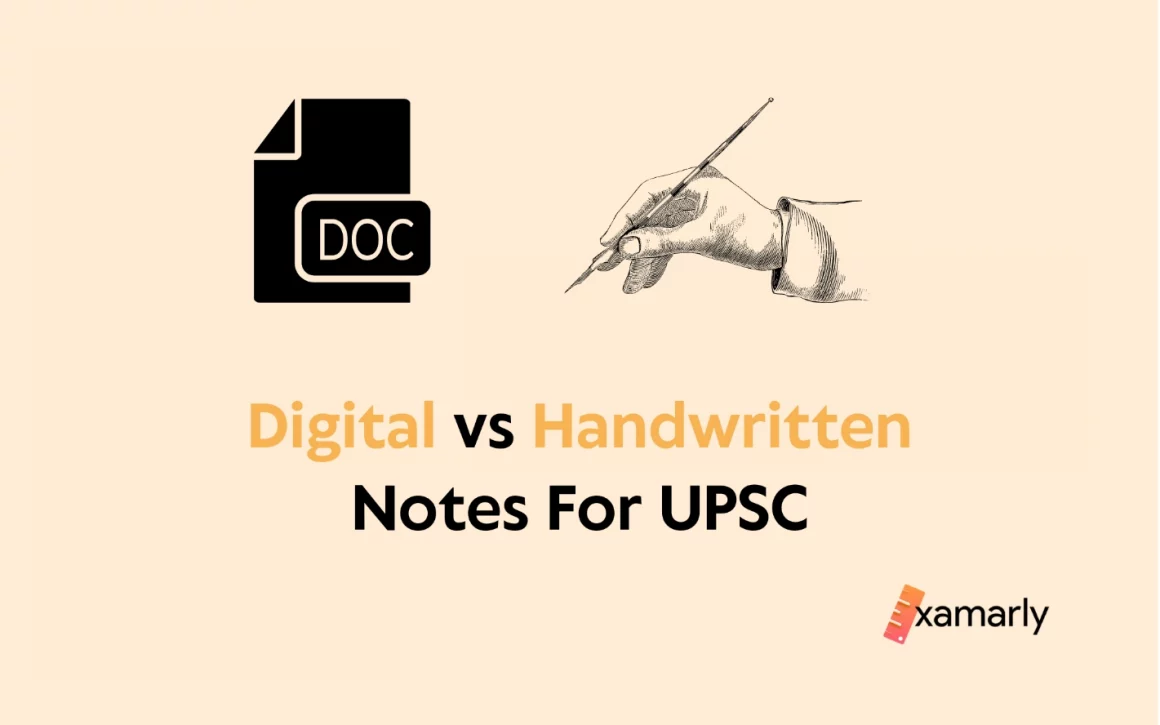Note-taking is one of the important exercises for learning and studying. It helps in packing relevant content from a wide portion of the syllabus of UPSC. Hence, making it easier to remember or recall or retain the relevant information.
This not only helps in retaining but also serves the purpose of producing study material that is very useful to revise during exam time.
This article will help you to decide whether digital vs handwritten notes for UPSC will help you.
- Handwritten Notes for UPSC Preparation
- Digital Notes for UPSC Preparation
- What are the Steps for Making Short IAS Notes?
- Conclusion
- FAQs around Digital vs Handwritten Notes for UPSC
- What are the advantages of using digital notes for UPSC preparation?
- What are the disadvantages of using digital notes for UPSC preparation?
- What are the advantages of using handwritten notes for UPSC preparation?
- What are the disadvantages of using handwritten notes for UPSC preparation?
- Which is better, digital notes or handwritten ones?
Handwritten Notes for UPSC Preparation
One of the old-school methods of taking notes for UPSC Preparation is using pen and paper. You can also make knowledge cards. This modality of taking notes is the most accessible way and costs less money than the notes penned down digitally.
Here we present the pros and cons of digital vs handwritten notes for UPSC for you to make a better decision.
Pros of Handwritten Notes for UPSC Preparation
Numerous benefits of handwritten notes for UPSC are there, some of which are listed below:
- Highly retentive: Researchers found that pen and paper notes are better than digital notes to retain relevant information in the long run.
The former method helps you to maintain focus, without being on an automated method while typing, making it easier to retain information. High retention is very important for current affairs. - Focus: It will also create a study atmosphere around you which will help you focus on studying and thus prevent you from getting distracted. This may not be achieved while making notes on a digital device as we use it for other purposes such as for our entertainment to pass time. Thus it is habitual that when you go for an old-school method of taking notes you switch to focus mode.
Your brain and body react to grab information. It helps you to concentrate more which leads to better engagement with the preparation of UPSC and hence will be fruitful. - Flexible and cheaper: Notebooks are cheaper than digital devices and are flexible as it is easy to write anywhere inside it.
- Strain-free: Not just for the preparation of UPSC but you also need your notes to revise.
For most people, the light of the computer screen causes strain on their eyes. This makes the old technique of taking notes a strain-free method that keeps your eyes in a healthy state and will not prevent you from studying.
Cons of Handwritten Notes for UPSC Preparation
In spite of the benefits, there are countless demerits to relying completely on pen and paper notes:
- The First valid argument is that handwritten notes are easy to lose if you are someone who is not highly organized. In no time, notes can be messy, if you put a lot of information without ordering and keep on editing.
- Handwritten notes in studies for UPSC need more space than digitally taken. You will keep on adding one after that until there is no room to store it in your cupboard.
- Paper notes are so many that you can’t carry them physically all the time or cannot easily share them with friends. You have to carry one or two in your hands for revision while going to group studies for UPSC, outside your house.
Digital Notes for UPSC Preparation
Digital notes in the preparation of UPSC are an easy way to pen down the relevant information from the books or other study materials and consolidate them in one place for later reference. You can use a mobile laptop, tablet or any other digital means.
Being advanced in nature, this modality leads to the minimum quantity of relevant and needed information to be retained in your memory. Hence you will be required to study later to build a strong grip.
Instead of having multiple notes which are not only hard to store but also move around. Digitalize those that are hardly used in studies for UPSC (but you may still need them sometimes).
Pros of Digital Notes for UPSC Preparation
Though digital notes have many plus points, some of them are mentioned below:
- Editing is Easy: In this mode of note-taking, It is easier to take and maintain notes as you can keep on adding some more left-out relevant points. You can edit anytime without creating a mess which makes it hard to study in the future.
- Easier to organize: You can include infographics, pie charts, or bar graphs easily. This will help you keep your notes organized, neat, and clean, and can compress a wide syllabus of UPSC into microform using graphics. This will also be beneficial for revision as you can revise quickly from these micro notes rather than the piles of books or handwritten notes.
- The organization is customizable: Sorting is easier as you can create limitless folders and files according to your purpose. Each file and folder can be renamed which will help you sort them or can be searched instantly and easily. Also, it will not fill up the physical space.
- Portable: A dozen physical notebooks are difficult to keep and more difficult to carry around whereas you can take e-notes anywhere with you.
- Sharing is easier: No scanning or copying is required in the case of digital notes. Such notes can be easily shared among your friends and at the same time you also have the actual notes, unlike paper notes, and hence it does not affect your studies for UPSC.
- Backup: One cannot make an effort to lose notes especially when the UPSC exam is approaching. You can easily have a backup of your notes if you have it in digital format. As paper notes are susceptible to wear or tear with time or may get lost which is not the case in digital versions especially when you have a backup.
Cons of Digital Notes for UPSC Preparation
- Low Retention: Unlike paper notes, making notes digitally will have low retention. As in the pen and paper method, we used to brainstorm the content which helps us to keep it in our memory for longer which is not the case in making digital versions. Also most of the time we use copy-and-paste content, which will not engage our brains to think differently.
- Distraction: We easily get distracted while making notes digitally via pop-up notifications or get engaged in other entertaining activities. Thus unable to focus on your studies for UPSC.
- Has a battery life: If it gets discharged or has electricity problems then it may prevent you from studying your notes for UPSC preparation.
- Strain: A computer screen may cause strain to your eyes that may resist you from UPSC Preparation. Making notes, or frequent revisions will require you to face the screen for a long time which may cause irritation to your eyes that leads to a headache and hence prevent you from studying.
Since both have a fair chance of demerits in the world of study and note-making, it’s better to balance the two with the right tactic, instead of ditching one method and opting for another to make notes.
Making separate notes on paper and in digital form will help you as you will read and write twice. Making both copies will enable you to have access to your notes almost all the time.
You Might Also Like To Read: UPSC Full Form.
What are the Steps for Making Short IAS Notes?
Step 1 – Maintain a Separate NoteBook: Maintaining a dedicated notebook will help you to segregate your long descriptive notes and the short ones. With this option, you can always choose between the two for study and revision purposes. Revising from short notes is easy and it takes a short duration of time to revise.
Step 2 – Breakdown The Syllabus: Breaking down the syllabus into smaller chunks and then making short notes putting only the highlights, summary, and the crux of the topic will help you while revisioning. This is a very effective note-making strategy.
Step 3 – Underline/Highlight the Key points: Although short notes mostly contain summaries, highlighting important things like dates, formulas, names, places, etc. will help you greatly in the revision phase. This practice will help you greatly with current affairs and General Knowledge.
Step 4 – Digital Notes: We use our electronic gadgets like smartphones, laptops, etc. almost all day. Preparing digital notes can come in handy while you are traveling, working in the office, etc.
Step 5 – Write One line For One Paragraph: Try and write only one line for each paragraph of your extensive notes. This way you will also try to understand the subject matter deeply which will increase your retention power.
Step 6 – Write in Good handwriting: Good legible handwriting is very important in UPSC. Writing notes in bad handwriting, that you might not be able to read, just for the sake of writing fast is not a good thing. Practicing for improving your handwriting will also help you to write beautifully in your UPSC Exam as well.
One of the best online platforms for UPSC CSE preparation, Examarly provides all the materials that you need to leverage in order to successfully pass the UPSC exam.
Its videos, notes, and books provide you with all the relevant information according to the syllabus of UPSC, while its daily quizzes will help you brush up on what you’ve just learned. It also has additional tools required in the preparation of UPSC.
Related Article: IAS Full Form.
Conclusion
Taking notes will become second nature to you in no time.
You won’t be able to recall everything. Taking notes allows you to concentrate and pay attention to what you have studied.
A fantastic technique for students to comprehend the importance of what they are studying is to take notes. Despite having a fantastic memory, you won’t be able to remember everything you’ve learned.
We hope that we answered your question and our article helped you make your decision on digital vs handwritten notes for UPSC.
FAQs around Digital vs Handwritten Notes for UPSC
What are the advantages of using digital notes for UPSC preparation?
The advantages of using digital notes are convenience, searchability, and accessibility. Digital notes can be easily edited, shared, and stored on various devices, making it easier to access and update.
What are the disadvantages of using digital notes for UPSC preparation?
The disadvantages of using digital notes are the risk of technology failure and the lack of physical engagement with the material. Additionally, excessive screen time can be a strain on the eyes and lead to distractions such as notifications and internet browsing.
What are the advantages of using handwritten notes for UPSC preparation?
The advantages of using handwritten notes are better retention and deeper engagement with the material. Handwriting allows for a more physical connection with the information and can lead to better comprehension and recall of the material.
What are the disadvantages of using handwritten notes for UPSC preparation?
The disadvantages of using handwritten notes are inefficiency, lack of organization and limited accessibility. Handwritten notes can also be difficult to edit and update, and can take up a lot of physical space.
Which is better, digital notes or handwritten ones?
Ultimately, the choice between the two formats depends upon individual preferences: like their learning style, and habits. Both have their own benefits and drawbacks, and it may be useful to experiment with both to find what works best for you.







